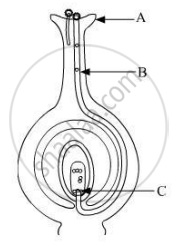Advertisements
Advertisements
Question
Triple fusion involves ______.
Options
Fusion of male gamete with female gamete
Fusion of tube nucleus with generative nucleus
Fusion of two polar nuclei
Fusion of second male gamete with two polar nuclei
Solution
Triple fusion involves fusion of second male gamete with two polar nuclei.
APPEARS IN
RELATED QUESTIONS
Name the parts A, B and C shown in the diagram and write their functions.

A student while observing an embryo of a pea seed in the laboratory listed various parts of the embryo as given below:
Testa, Tegmen, Radicle, Plumule, Micropyle, Cotyledon.
On examining the list the teacher remarked that only three parts are correct. Select three correct parts from the above list:
(a) Testa, Radicle, Cotyleddon
(b) Tegmen, Radicle, Micropyle
(c) Cotyledon, Plumule, Testa
(d) Radicle, Cotyledon, Plumule
A student identified the various parts of an embryo of a gram seed and listed them as given below :
(I) Testa
(II) Plumule
(III) Radicle
(IV) Cotyledon
(V) Tegmen
Out of these the actual parts of the embryo are :
(A) I, II, III
(B) II, III, IV
(C) III, IV, V
(D) II, IV, V
"The chromosomal number of the sexually producing parents and their offspring is the same." Justify this statement.
Name the part made up of the stigma, style and ovary.
What are the reproductive organs in a flower?
Where is the male gamete formed in flowering plants?
Fill in the following blank with suitable word :
The ovule becomes a .......... after fertilisation.
Fill in the following blank with suitable word :
The female organ of reproduction in the flower is the...........
What is made in anther of a flower?
What is made in ovary of a flower?
Explain the terms 'cross-pollination'?
What is seed? What are the parts of a seed? Explain with the help of a labelled diagram.
What is pollination? How does pollination occur?
Which of the following statements are true for sexual reproduction in flowering plants?
(i) it requires two types of gametes
(ii) fertilisation is a compulsory event
(iii) it always results in the formation of zygote
(iv) offsprings formed are clones
(a) (i) and (iv)
(b) (i), (ii) and (iv)
(c) (i), (ii) and (iii)
(d) (ii), (iii) and (iv)
The correct sequence of reproductive stages occurring in flowering plants is ______
What is a flower ? Draw a neat labelled diagram showing the L.S. of a typical flower.
Fill in the blanks:
A carpel consists of ________ , ________ and ________.
Fill in the blank:
Seeds are formed from________.
You have to perform the experiment, "To identify the different parts of an embryo of a gram seed." Describe the procedure that you would follow.
List any two differences between pollination and fertilisation.
Explain sexual reproduction in plants.
Answer the following question.
How does suitable pollination lead to fertilization?
What is cleistogamy? Write one advantage and one disadvantage of it, to the plant.
What is meant by pollination?
Find the odd one out:
Calyx : Sepals : : Corolla : ________________
Pollen grains from anther are transferred to the stigma.
Give scientific reason.
Flower is a structural unit of sexual reproduction in plants.
Draw a neat and labelled diagram.
Double fertilization in angiosperms
Observe the figure below. Write functions of the labelled parts.

Write the events involved in the sexual reproduction of a flowering plant.
a. Discuss the first event and write the types.
b. Mention the advantages and the disadvantages of that event.
In which part of the flower germination of pollen grains takes place?
Antipodal cells are present towards the ______ in an anatropous ovule.
The process of release of eggs from the ovary is called ______
In human beings, fertilization occurs in the ______
Length of pollen tube depends on the distance between ______
Which among the following statements are true for sexual reproduction in flowering plants?
- It requires two types of gametes
- Fertilisation is a compulsory event
- It always results in formation of zygote
- Offspring formed are clones
Is the chromosome number of zygote, embryonal cells and adult of a particular organism always constant? How is the constancy maintained in these three stages?
Draw the diagram of a flower and label the four whorls. Write the names of gamete producing organs in the flower.
